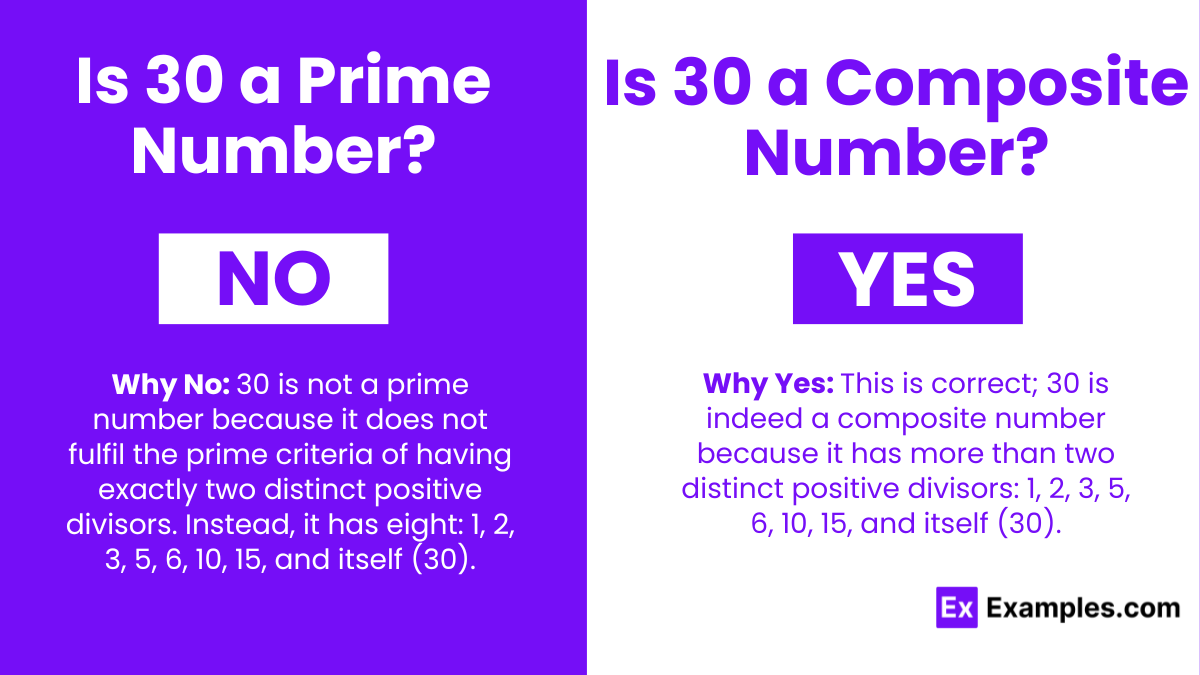Is 30 a prime number?
Yes
No
Maybe
Not enough information


No – 30 is not a prime number.
Why No: 30 is not a prime number because it does not fulfil the prime criteria of having exactly two distinct positive divisors. Instead, it has eight: 1, 2, 3, 5, 6, 10, 15, and itself (30). See any number if it’s prime number or not
YES – 30 is a Composite Number
Why Yes: This is correct; 30 is indeed a composite number because it has more than two distinct positive divisors: 1, 2, 3, 5, 6, 10, 15, and itself (30).
| Property | Answer |
|---|---|
| Is 30 a prime number? | No |
| Is 30 a composite number? | Yes |
| Is 30 a perfect square? | No |
| Factors of 30 | 1, 2, 3, 5, 6, 10, 15, 30 |
| Multiples of 30 | 30, 60, 90, 120, 150, 180, 210, 240, 270, 300 |
| Cube Root of 30 | 3.11 |
| Square of 30 | 900 |
| Square Root of 30 | 5.48 |
| Is 30 a Perfect Square? | No |
| Is 30 a Perfect Cube? | No |
| Is 30 an Irrational number? | No |
| Is 30 a Rational number? | Yes |
| Is 30 a Real number? | Yes |
| Is 30 an Integer? | Yes |
| Is 30 a Natural number? | Yes |
| Is 30 a Whole number? | Yes |
| Is 30 an Even or odd number? | Yes (30 is an even number) |
| Is 30 an Ordinal number? | Yes |
| Is 30 a Complex number? | Yes (as all real numbers are also complex numbers) |
The factors of 30 are 1, 2, 3, 5, 6, 10, 15, and 30. Since 30 is not a square number, its factors include 1, 2, 3, 5, 6, 10, 15, and itself. There are no more factors of 30.
30 is recognized as a composite number because it has more than two divisors, which distinguishes it from prime numbers that are only divisible by 1 and themselves. The number 30, being the product of the first three prime numbers (2, 3, and 5), holds a unique place in mathematics and various cultural contexts, often associated with completeness and the turning of a page.
What are the 30 prime numbers?
The first 30 prime numbers start with 2 and end with 113, forming a unique sequence of numbers that are only divisible by 1 and themselves.
Is 30 a Whole number?
Yes, 30 is a whole number as it is a non-negative integer without fractions or decimals, fitting perfectly into the set of whole numbers
Text prompt
Add Tone
10 Examples of Public speaking
20 Examples of Gas lighting
Is 30 a prime number?
Yes
No
Maybe
Not enough information
Which of the following correctly classifies the number 30?
Prime
Composite
Neither
Undefined
Is 30 divisible by any number other than 1 and 30?
Yes
No
Only by 2
Only by 3
Which number is 30 NOT divisible by?
2
3
7
9
Which of the following statements about the number 30 is correct?
30 is a prime number because it ends in 0.
30 is a composite number because it has more than two factors.
30 is a prime number because it can be written as the sum of two prime numbers.
30 is neither prime nor composite.
Is 30 a prime number because it is not a perfect square?
Yes
No
Sometimes
Not relevant
Can 30 be classified as a prime number based on its factors?
Yes, if it has exactly two factors.
No, because it has more than two factors.
Yes, if it is greater than 20.
No, if it is less than 20.
Which of the following correctly describes 30?
Prime, as it is divisible by 10.
Composite, as it is divisible by multiple numbers.
Prime, as it is a large number.
Composite, as it has only one factor
If a number has the factors 1, 2, 3, 5, 6, 10, 15, and 30, what type of number is it?
Prime
Composite
Perfect square
Even
Which property does 30 have that confirms it is not a prime number?
It is even.
It ends in 0.
It has more than two distinct factors.
It is greater than 20.
Before you leave, take our quick quiz to enhance your learning!

